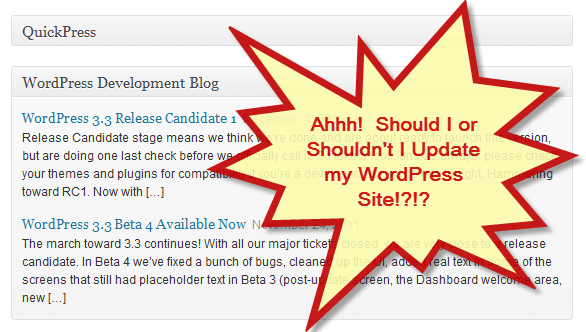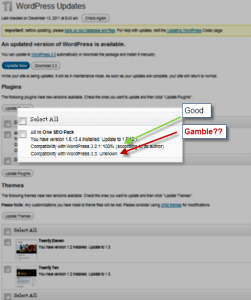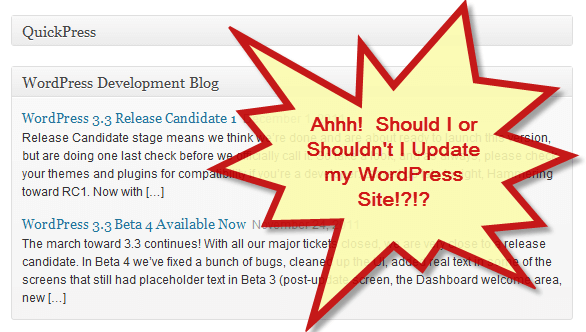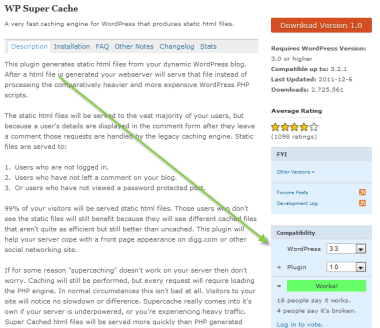
Its just about time for a relatively big new WordPress update, and each time I ask myself, “Should I update to the New WordPress?”
My answer to myself is always no, and yes. As a developer, I almost always do update right away, just to get my hands on the new system and start learning and experiencing the good and bad of the new system. I can and do run it in a test site, but I generally also run it on my live sites. That’s not wise, and not what I preach to my clients (hint at my answer for everyone else). I do that so that I can get as much first hand experience with the new system so that I can better understand what my client’s first impressions will be.
- Will the new WordPress update feel easy?
- Will the new WordPress update break or create a lot of bugs?
- Will the new WordPress update conflict with existing themes or plugins or combinations of the two?
- Will the new WordPress update drive me nuts or make my life infinitely easier?
- and maybe most important of all, Will the new WordPress update be more secure than my current older version, whatever it is?
My answer to my clients and to the world in general is that unless you are developing WP themes, plugins, or the WP core itself,
wait at least a week to Upgrade WordPress!
If the first week is real ugly, wait a month,
but don’t wait too long!
This is the world of open source content management system updates. Things are continually evolving and overall they do get better from one update to the next, they sometimes create a bug or two and or a conflict and you might have a time getting used to a new interface, but they are almost always more secure than older versions if for no other reason than hackers haven’t had a chance to learn new vulnerabilities yet.
There are multiple ways to backup your WordPress website. Not all methods are equal. Some are much more difficult than others to manage. You might go with a simple (but incomplete) WordPress export of content or theme settings. You might backup through several hosting software solutions such as:
You might even pay a premium and make life super easy with something like BackupBuddy. Regardless, do backup your site, and then don’t be so gun shy about updating your site.
After you update WordPress do test out the site, check the functionality and especially focus on the functionality that each of your plugins are supposed to provide. If you have/had any custom code in your theme, test that out too. If something is not working correctly consider restoring your backup, and waiting for your plugin or theme to roll out an update that is compatible with your new WordPress install. If that update proves to be too slow, consider dropping that plugin or theme for a new one that will stay up to date.
If any of this sounds to difficult, or you just don’t have the time, Get WordPress help fast! 🙂 (Yes I’m biased as I provide people with this kind of help. I’m not trying to solicit your business with this article, but do get help somewhere.)
If you leave your site running an older version of WP your risk of getting hacked goes up and up and up.
Signs that You Might be ready to Upgrade
So how do you know when it is time to go? After you login to WordPress, click on Dashboard> Updates. If you see a long list of plugins that are ready for an auto update, and those updates show that the plugin developer believes the plugin is compatible with the new version of WordPress, the version that you have not yet upgraded to, then you might be close to ready.

Upgrade/Update those plugins first. Review all of your installed plugins and if they all seem to be compatible with the new WordPress then you might finally be ready. (make a back up first, just in case).
You can check each plugin manually by going to WordPress admin area Plugins> Installed Plugins> All
This will show a list of all plugins. You need to check all plugins whether they are active or not.
To actually check if they are compatible things get very manual and a little messy.
- Plugin by plugin, copy the Plugin name
- open a google search window and paste in the name followed by wordpress plugin
- This will likely take you to the WordPress plugins page http://wordpress.org/extend/plugins/ for that specific plugin
- Scroll down and on the right there is a Compatibility tool for every plugin that tells you whether or not Users of the plugin thought that the plugin was or was not compatible with any given version of WP.
- Repeat this process for every plugin. 🙁 yeah lots of work
- If you have a plugin that is not compatible, then contemplate either delaying the upgrade of WordPress, deactivating or deleting the plugin, or setting up a test installation of your site to take the new version of WP with this individual plugin for a test drive, then a more advanced test to test all of your plugins with the new WordPress version.


